Reviews for June 19th, 2009
Dead Snow
Directed by Tommy Wirkola.
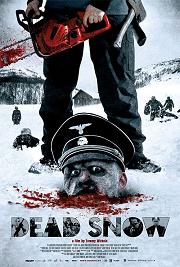
In Norwegian with subtitles. A group of seven medical students, Vegard (Lasse Valdal), Martin Hovden (Vegar Hoel), Hannah (Charlotte Frogner), Erland (Jeppe Beck Laursen), Chris (Jenny Skavlan), Liv (Evy Kasseth RÝsten) and Roy (Stig Frode Henriksen), hike through snowy mountains to the remote cabin belonging to their friend, Sarah (Ane Dahl Torp), who hiked there separately. All begins well for them as they have a lot of fun in the snow while making references to horror films set in the woods such as Evil Dead and Friday the 13th.The opening scene, showing a woman who runs through the forest from something vicious thatís threatening her life, foreshadows the later events. Once the group of friends reach Sarahís cabin and canít find Sarah anywhere around there, thereís a palpable sense that something bad is imminent. Itís just a question of when and to whom itíll happen to. Out of nowhere, a man (BjÝrn Sundquist) shows up at their door in the middle of the night and explains the history about how, during WWII, local villagers staged a revolt against the Nazi officers using all the tools they could find as weapons. Most of the officers died, but others mysteriously disappeared into the mountains where they were probably frozen to death. Soon after he tells that story, the first Nazi zombie emerges from the snow to brutally kill him inside his tent. Director/co-writer Tommy Wirkola stretches the first act a bit too long as that first onscreen killing doesnít occur until about halfway into the film. Once the engine ignites at that moment, though, it turns into macabre fun with lots of energy and gory death sequences, none of which will be spoiled here, but itís worth mentioning that thereís lots of blood to be found oozing from different kinds of wounds, i.e. disembowelments. Thereís really not that much of a point to anything that happens and you wonít find yourself caring about any of the characters, but as long as your check your brain at the door and suspend your disbelief for 90 minutes, you wonít find yourself bored during the intense second half of the film. Ultimately, Dead Snow manages to be a mindlessly entertaining horror film that starts off slow and dull, but, midway, it turns into a tongue-in-cheek, gory and guilty pleasure that will please avid horror fans. For maximum enjoyment, see it late at night with a large group of friends and an alcoholic beverage or two at hand. Number of times I checked my watch: 3Released by IFC Films. Opens at the Cinema Village. 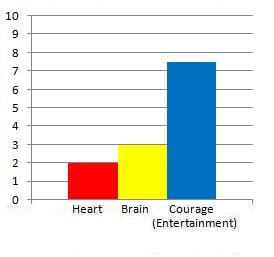
The End of the Line
Directed by Rupert Murray.
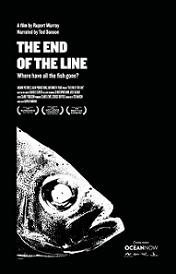
Based on the book The End of the Line by Charles Clover. This provocative and illuminating documentary, narrated by Ted Danson, tackles the issue of overfishing and exposes its detrimental impact on the oceans around the world. Just when you thought that global warming or the toxins in our food and air are the most imminent threats to evolution, now thereís overfishing which, according to scientists, threatens to totally wipe out all the marine life in the sea within less than fifty years. Many restaurants still serve blue fin tuna and cod even though itís a type of fish thatís nearing extinction because of overfishing. What many simple-minded people donít understand is that even the extinction of one species of fish can have a huge impact on the ecosystem as a whole, especially in the long run. Director Rupert Murray wisely interviews many experts of ocean-life, such as scientists and fisherman, such as Roberto Mielgow, who speak out about the horrors of overfishing. A fine restaurant such as Nobu still serves the fish despite that its menu informs its costumers about the risks of the speciesí endangerment. The car company Mitsubishi owns a large chunk of the blue fin tuna market and play a large role in causing the species to become endangered. Where are these companiesí morals? Theyíre clearly undermining the environmental impacts and evolution just for the sake of profit. Ignoring the issue of overfishing or using euphemisms to describe its serious harms wonít make the issue go away. Murray bravely exposes the issue in a coherent, easy-to-follow way with some gorgeous underwater footage. There are some particularly powerful and haunting images that stay with you, such as when a boat pulls a large fishing net on the ocean floor and scoops up hundreds of fish all at once or disturbing, gruesome footage of fish being killed. More profound explorations of some of the revelations would have added a bit more insight, but at least the film remains easily accessible and focused from start to finish. Ultimately, The End of the Line manages to be an illuminating, provocative and important wake-up call for everyone young and old. Number of times I checked my watch: 2Released by New American Vision. Opens at the Cinema Village. 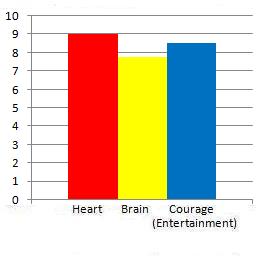
The Narrows
Directed by FranÁois Velle.
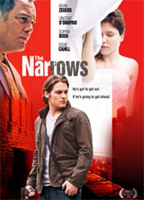
Based on the novel The Heart of the Old Country by Tim McLoughlin. Mike Manadoro (Kevin Zegers) lives in Bay Ridge, Brooklyn, with his widowed father, Vinny (Vincent D'Onofrio), an ex-sanitation worker whoís now working as a bookie and lives on disability. Mike has a passion for photography and hopes to hone his skills by studying it in college. After Tony (Titus Welliver), a mob boss, gives him a job delivering mysterious packages, he has finally has enough money saved up to attend college and to pursue his dreams. He starts dating Kathy Popovich (Sophia Bush), a good-natured girl from his photography class, but heís still hasnít broken off the relationship with his fiancťe, Gina (Monica Keena), and doesnít want Kathy to find out about his connection to the mob. When he reunites with his childhood friend, Nicky Shades (Eddie Cahill), whoís now a morphine addict, he gets into more and more life-threatening trouble and finds it increasingly difficult to hide his dark secret from Kathy. Although the screenplay by Tatiana Blackington offers no refreshing ideas in terms of plot and follows a standard formula, at least it follows that formula while keeping you engaged in the story, for the most part. Kevin Zegers gives a solid performance as the protagonist, Mike, and brings charisma to his role so that you can sense what Kathy sees in him to begin with. He wants the money that his mob-related job gets him, but, concurrently his heart isnít quite there---itís a conflict between his needs and his wants. As sociologist/psychoanalyst Slavoj éiěek once said, ďgoodĒ just sits there passively while ďevilĒ is filled with temptation, energy and tries to suck you into it like a whirlpool. Mike doesnít have the courage or smarts to avoid getting caught up the evils of the mob and gets farther and farther down into the whirlpool. Does he really think that he could find safety, security and happiness while leading a double-life? Heís fundamentally a good guy caught up in bad situations and involved with dangerous people. Thanks to some sharp dialogue and convincing performances, especially by Vincent DíOnofrio, youíre able to root for Mike and hope that he gets out of the whirlpool alive. The romantic moments between Mike and Kathy arenít particularly engrossing or filled with palpable sparks, but, fortunately, there arenít any awkward, contrived or cringe-inducing moments between them. Admittedly, though, the plot goes the over-the-top during the violent third act which veers into a much darker, grittier tone thatís slightly off-putting and convoluted. Blackington should have included some much-needed comic relief to balance all of the heaviness of the drama. Director FranÁois Velle includes impressively slick cinematography and editing along with a terrific soundtrack that helps to invigorate the film from start to finish. Although it offers nothing fresh, new or surprising and somewhat falls apart in the messy third act, The Narrows, nonetheless, manages to be an often captivating, visually stylish drama with solid performances and sharp dialogue. Number of times I checked my watch: 2 Released by Cinedigm. Opens at the Clearview Chelsea Cinemas. 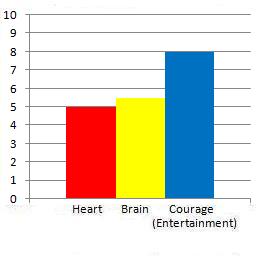
The Proposal
Directed by Anne Fletcher.

Andrew Paxton (Ryan Reynolds) works as an assistant for his uptight boss, Margaret Tate (Sandra Bullock), a book editor based in New York City. When sheís faced with deportation back to Canada, she calls Andrew into her office and pretends that heís her soon-to-be husband in front of the immigration agents. He reluctantly agrees because, otherwise, he would lose his job under the boss who would replace her. After a brief interview with an immigration agent, Mr. Gilbertson (Denis O'Hare), who suspects that Margaret chose to marry Andrew just to keep her Visa status in the US, theyíre told that they have until the following Monday to get to know every little detail about each other for a lengthy interrogation. Before then, though, Andrew takes Margaret to the lakeside home of his parents all the way up in Alaska for the weekend. There, Margaret meets his mother, Grace (Mary Steenburgen), disapproving father, Joe (Craig T. Nelson) and grandma, Annie (Bettie White), whoís about to celebrate her 90th birthday. Itís not that easy for her to warm up to her new family and their lifestyle. An eagle even steals her cellphone on the front lawn and the cute family dog doesnít quite get along with her. Will Andrew be able to keep the secret of why heís marrying Margaret from his family? Will the immigration agent learn about the secret somehow? Will Andrew and Margaret somehow fall in love unexpectedly? Anyone who doesnít know the answer to any of those questions probably hasnít watched too many romantic films before. To call the plot predictable and formulaic would be to state the obvious. What matters, though, is whether or not Andrew and Margaret have any kind of chemistry together so that youíd want them to end up together. Unfortunately, the contrived, stilted screenplay by Peter Chiarelli aims too often for silly, sitcom-ish humor that falls flat with poor comic timing and repetitiveness. Sandra Bullock and Ryan Reynolds are both capable of being funny in other films, but they simply arenít able to rise above the material here, with the exception of one slapstick scene that will make you laugh-out-loud for its zaniness. Of all of the characters, the only ones who bring some much needed oomph are Betty White as the grandma and Oscar NuŮez as a hilarious exotic dancer/priest/shopkeeper Ramone. Director Anne Fletcher moves the film along at a brisk pace, but it doesnít feel as breezy as it should. The cinematography often looks terrible with awkward angles and, on top of that, the transitions between many scenes lack fluidity. At a running time of 107 minutes, The Proposal has fleeting moments of hilarity and charisma, but ultimately falls flat as a romance, comedy and drama with an inane, sitcom-ish, uninspired and lazy screenplay along with sloppy editing and direction. Please be sure to stay through the end credits for additional scenes as the credits roll. Number of times I checked my watch: 5 Released by Touchtone Pictures. Opens nationwide. 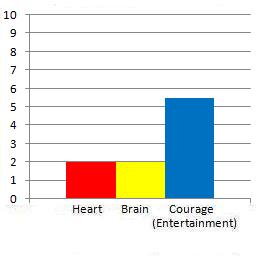
Under Our Skin
Directed by Andy Abrahams Wilson.
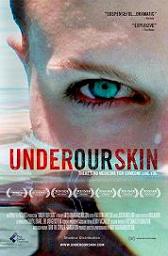
This alarming, moving and provocative documentary exposes the cover-up of Lyme disease as a chronic illness that requires long-term medical treatment. Too many doctors throughout the U.S. arenít well-informed enough to diagnose the disease correctly and easily confuse it with a wide range of other diseases such as Lupus, Multiple Sclerosis, ALS, Alzheimerís, Parkinsonís, Fibromyalgia, Chronic Fatigue Syndrome and many more. Even patients who are diagnosed with Lyme Disease are given medical treatment only for a short amount of time and when they complain of symptoms afterward, theyíre told that itís all in their head. Director Andy Abrahams Wilson provides a brief history of the disease as well as clever animations showing how a tiny tick bite transmits the disease into a humanís bloodstream. He also includes well-balanced interviews with doctors who admit the existence of the cover-up while others deny that Lyme disease should be considered chronic. One particular doctor, Dr. Alan Macdonald, a pathologist, has done a lot of research and studies of the disease using his high-powered microscope where he discovered a type of bacteria, B. Burgdorferi, that distinguish it from Alzheimerís disease. Itís equally devastating and moving to watch the many Lyme disease patients, young and old, who suffer each day from the misdiagnosed disease. Jordan Fisher Smith, for example, regrets that he had wasted over $100,000 in medical bills because doctors had misdiagnosed him. Many Lyme disease patients could have still been alive today had they been diagnosed and medically treated properly. Wilson digs deeper to show you the root of the cover-up comes from: greedy medical insurance companies donít want to lose profits by spending more money for medical treatment. By undermining public health for the sake of profits, theyíre crossing moral boundaries and eve, so you have every right to feel enraged. Itís even more enraging to observe the conflicts of interest that exist, i.e. when HMOs pay the medical board money or when so-called ďreliableĒ studies of Lyme disease are actually done by doctors who have ties to health insurance companies. Anyone who chooses to disagree with the ďpartly lineĒ, that Lyme disease isnít a chronic illness, faces aggressive persecution and huge lawsuits. Dr. Joseph Jemsek, for example, lost his medical license for a year and, soon enough, was sued by an insurance company for $100 million, which forced him to close down his clinic. Insurance companies use fear tactics, propaganda and targeting key individuals, which happen to be similar tactics used by fascists as a means to close down a democracy or, in this particular case, health democracy. Patients and doctors should have every right to speak out and to spread the truth about Lyme disease while being fully informed of its appropriate diagnosis and medical treatment. Ultimately, Under Our Skin manages to be a vital, insightful, brave and moving documentary that will wake you up and shake you up to the harsh realities of Lyme disease.
(If you truly care about your health, please click here to learn about the cover-up of hidden MSG, another cover-up that also involves conflicts of interest within the health industry.)
Number of times I checked my watch: 1 Released by Shadow Distribution. Opens at the IFC Center. 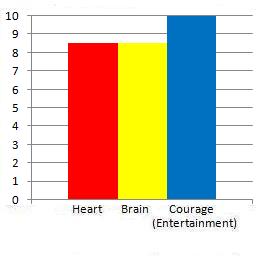
Year One
Directed by Harold Ramis.
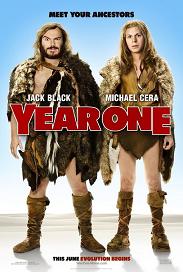
Zed (Jack Black), a hunter, lives in a primitive village with his friend, Oh (Michael Cera), a gatherer. One day, Zed eats the forbidden fruit from the tree of knowledge that leaves him with a curse. The inhabitants of his village banish him so as not to spread the curse into the village. Soon enough, he and Oh run away from the village on a journey through ancient lands. They meet Cain and Abel (David Cross) and Abel (Paul Rudd) along their way as well as Abraham (Hank Azaria) about to sacrifice his son, Isaac (Christopher Mintz-Plasse). Zed and Oh eventually end up in the land of Sodom where the kingdom of Sodom, where they meet and fall in love with enslaved women, Maya (June Diane Raphael) and Eema (Juno Temple), who are about to be become sacrificed under the order of the High Priest (Oliver Platt). Xander Berkley plays the evil king of Sodom. Director/co-writer Harold Ramis, who had written and directed classic, laugh-out-loud comedies such as Groundhog Day, Caddyshack and Analyze This, fails to generate any real laughter or to include any refreshingly innovate ideas. Does the image of Michael Cera rubbing oil on Oliver Plattís hairy chest sound funny to you? Or how about when someone lets one rip, so-to-speak, repeatedly in the middle of the night while sleeping next to Michael Cera? There are so many scenes that fall flat in terms of comedy that thereís nothing left but blandness. Characters who behave stupidly or foolishly can still be funny, i.e. in Wayneís World or Bill and Tedís Excellent Adventure, as long as thereís an intelligent and imaginative screenplay. None of the actorsí comedic talents can save the film from sinking into an abyss of silliness and stupidity to the point of making you feel irritated ŗ la the almost entirely unbearable comedy from 1994,The Flintstones. An important message to Judd Apatow: just because a comedy has crude, rude and lewd humor doesnít mean that itís inherently funny. Classic satirical comedies such as Blazing Saddles, History of the World Part I and any Monty Python movie at least had a mixture of great comic timing and a witty, clever and quotable screenplay that never felt lazy. At a running time of 97 minutes, Year One often drags and should have been retitled as The Neverending, Painfully Unfunny Story. It falls on its face both a comedy and as a satire with a lazy, asinine and mean-spirited script. Even the outtakes donít induce any real laughs. Number of times I checked my watch: 6 Released Columbia Pictures. Opens nationwide. 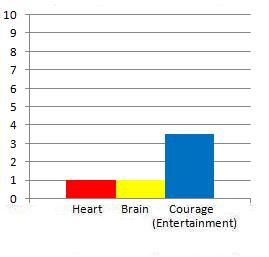
Main Page
Alphabetical Menu
Chronological Menu
______________________________________________________
|












